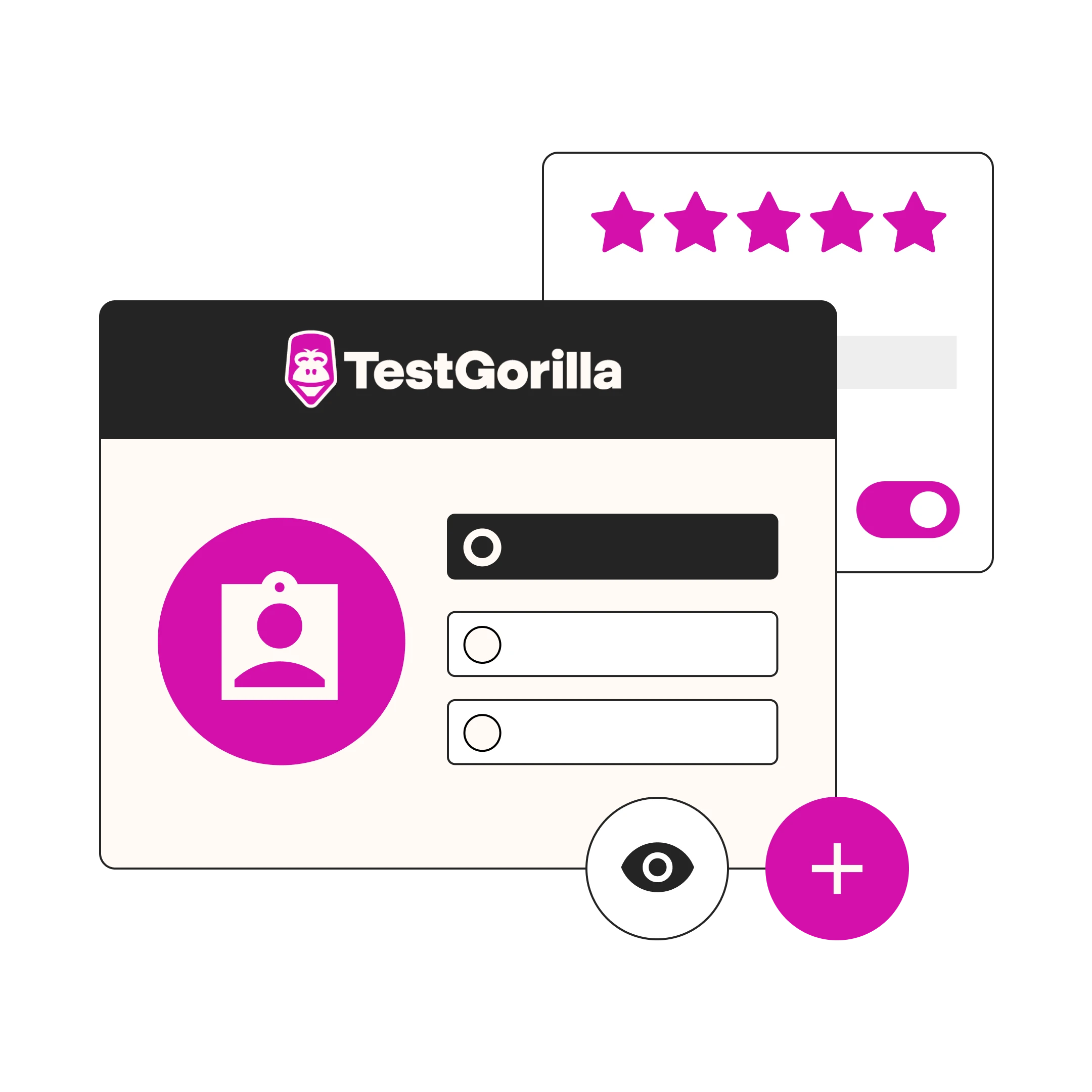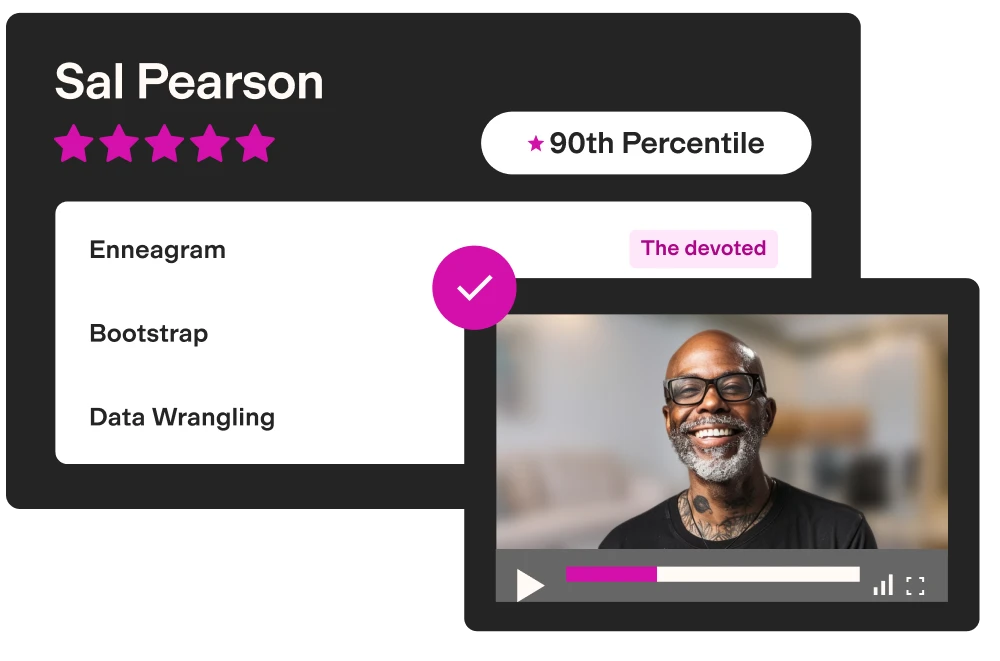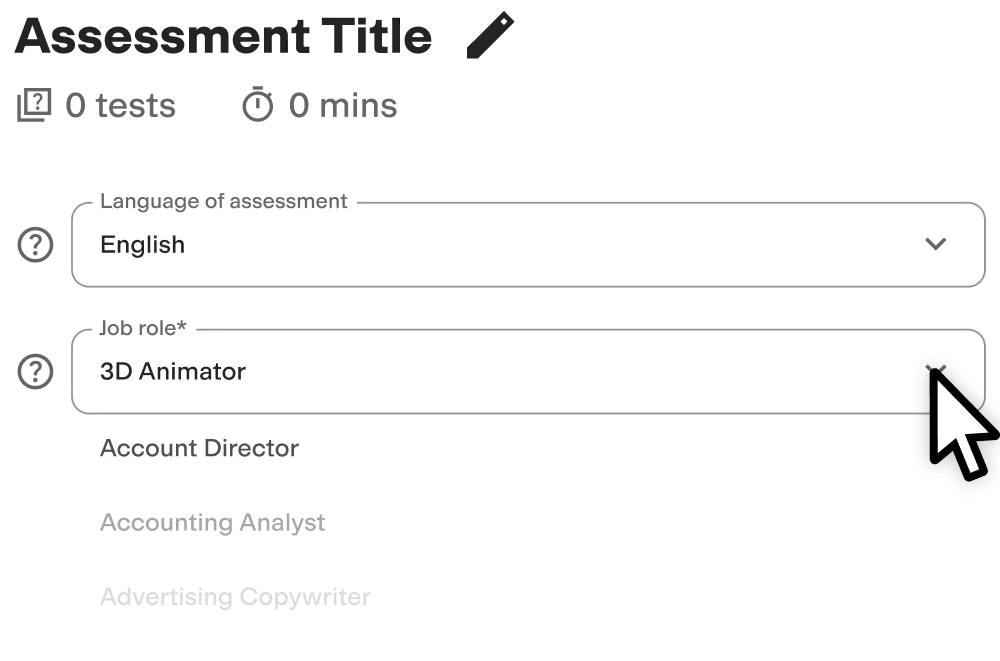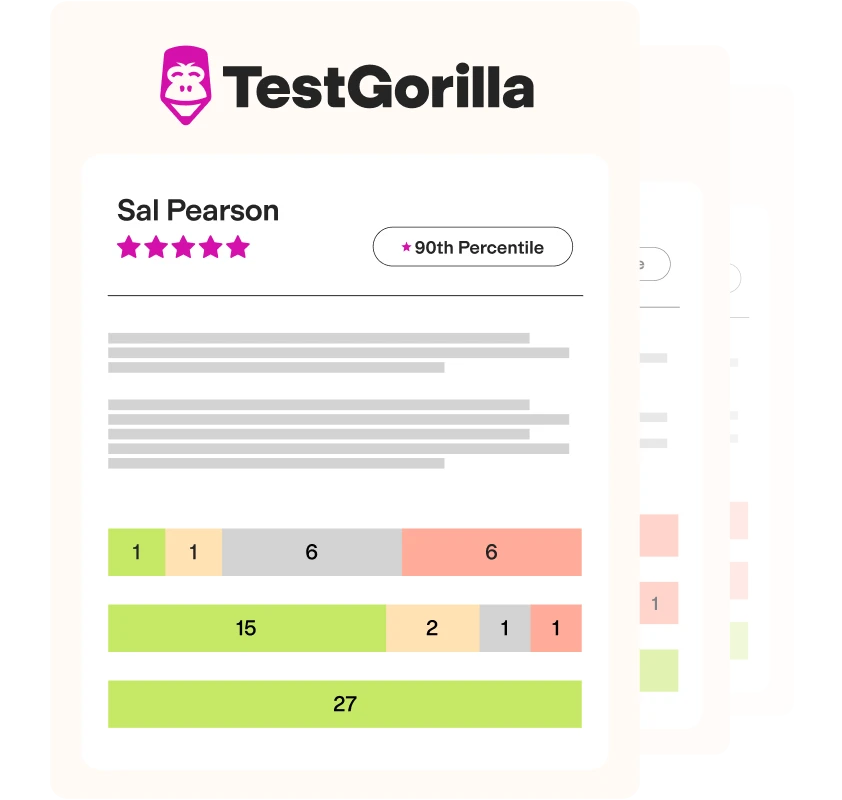Data Science skills test: Pre-employment screening assessment to hire the best candidates
Summary of the Data Science test
This Data Science test assesses candidates’ skills in core topics of statistics, fundamentals of data science and programming, machine learning, and neural networks. The test is designed to help you identify mid-level data scientists.
Covered skills
Statistics
Fundamentals of data science and programming
Machine learning
Neural networks and deep learning
Use the Data Science test to hire
Data scientists, data analysts (advanced), forecasting analysts, modeling analysts, machine learning scientists, or other roles that require a good knowledge of data science.
About the Data Science test
The field of data science is a broad and complex one, requiring not only an understanding of statistics and probability theory but also the ability to work with data in practical, meaningful ways. Hiring candidates proficient in these areas can help your organization unlock insights from vast amounts of data, drive strategic decision-making processes, and stay competitive in today's data-driven market.
This Data Science test evaluates candidates' abilities across four key skill areas: statistics, fundamentals of data science and programming, machine learning, neural networks, and deep learning. These components are crucial for any professional working within the field as they form the foundation for sophisticated analysis and predictive modeling.
This screening test will assist you in identifying individuals who can effectively translate raw information into actionable strategies. Candidates who excel on this test will have demonstrated their capacity to use advanced techniques such as machine learning algorithms or neural networks to derive valuable insights from large datasets. Their skills could lead to more accurate forecasting models, better customer segmentation strategies or even new product ideas based on trend analysis.
To evaluate these data science skills, this test uses real-world data challenges to generate questions that evaluate important data science skills. The results from this assessment will allow you to make confident hiring decisions that contribute positively towards your business objectives.
The test is made by a subject-matter expert
Vincent F.
Vincent has one mission: to share his expertise in data science and increase data literacy - a goal that’s evident in all of his endeavours. His greatest pleasure stems from teaching the fundamentals of data science in a way that’s accessible to all students.
Having worked for several years for companies big and small, Vincent is now taking his data science proficiency to the next level: he’s currently working on his Master’s thesis in machine learning and operations research.
Crafted with expert knowledge
TestGorilla’s tests are created by subject matter experts. We assess potential subject-matter experts based on their knowledge, ability, and reputation. Before being published, each test is peer-reviewed by another expert, then calibrated using hundreds of test takers with relevant experience in the subject.
Our feedback mechanisms and unique algorithms allow our subject-matter experts to constantly improve their tests.
What our customers are saying
TestGorilla helps me to assess engineers rapidly. Creating assessments for different positions is easy due to pre-existing templates. You can create an assessment in less than 2 minutes. The interface is intuitive and it’s easy to visualize results per assessment.

VP of engineering, mid-market (51-1000 FTE)
Any tool can have functions—bells and whistles. Not every tool comes armed with staff passionate about making the user experience positive.
The TestGorilla team only offers useful insights to user challenges, they engage in conversation.
For instance, I recently asked a question about a Python test I intended to implement. Instead of receiving “oh, that test would work perfectly for your solution,” or, “at this time we’re thinking about implementing a solution that may or may not…” I received a direct and straightforward answer with additional thoughts to help shape the solution.
I hope that TestGorilla realizes the value proposition in their work is not only the platform but the type of support that’s provided.
For a bit of context—I am a diversity recruiter trying to create a platform that removes bias from the hiring process and encourages the discovery of new and unseen talent.

Chief Talent Connector, small business (50 or fewer FTE)
Use TestGorilla to hire the best faster, easier and bias-free
Our screening tests identify the best candidates and make your hiring decisions faster, easier, and bias-free.
Watch what TestGorilla can do for you
Create high-quality assessments, fast
Building assessments is a breeze with TestGorilla. Get started with these simple steps.
View a sample report
The Data Science test will be included in a PDF report along with the other tests from your assessment. You can easily download and share this report with colleagues and candidates.
The benefits of recruiting with the Data Science test
A data science test is an important way to assess applicants’ core skills when it comes to data science. The candidate needs to be well-versed in topics such as:
Statistics
Machine learning
Neural networks
Deep learning
Our Data Science test is designed to help you evaluate entry- to mid-level data scientists.
Data science aims to find algorithms (patterns) within a specific set of data. That’s why data scientists need to know their way around statistical techniques: they need to analyze the data, process it, and find insights.
Then, the data scientist uses this insight as a prediction model. It’s about determining what could happen in the future by using the insights gathered from the data. That’s why a data scientist’s job is so important. With these models, companies can make better, smarter, and more accurate business predictions for the future.
So having a really good data scientist is a matter of better preparing your organization for the future. That’s why you need to effectively evaluate your candidates – and a data-science test will help you to identify the top talent.
How you can use data science in the workplace
You can use data science in any number of fields inside your organization. The process will help your teams to run more efficiently. Here are some examples of how you can use data science in your company’s teams:
• Marketing: You can use data science in marketing for channel optimization, better lead targeting, real-time interaction with customers, maintaining customer loyalty, and predictive analysis.
• Sales: Data science can be used in sales for predicting sales, streamlining the sales process, improving lead generation, increasing results for cross-sells and upsells, improving the customer’s lifetime value, reducing churn rate with clients, and even setting the right price for your products and services.
• HR: In HR, you can use data science for employee sentiment analysis, reducing employee turnover, improving learning and development initiatives, streamlining the hiring process, and implementing a better onboarding process.
There are some other applications of data science in the workplace, such as improving data and systems security, improving business intelligence, and carrying out complex data interpretations. Generally, it can help employees to make better decisions overall.
Data science competencies for candidates
Data scientists need to have certain competencies to do their job well. The skills that they should have are:
Knowledge of linear algebra
Understanding of mathematical principles such as dimensionality reduction and multivariable calculus
Coding and programming skills
Experience in Python
Knowledge of predictive modeling
Experience with data wrangling
Machine learning skills
Understanding of neural networks
Communication skills
The right data science candidate
The right candidate will have all of the above-mentioned skills, but they will also have some underrated skills that are a bit harder to measure. They will have a pragmatic outlook that enables them to connect machine-learning models and data to find insights that are relevant for the business’s bottom line.
Not only that, but they will also need to work well with others to get the most out of data; creating business value from data science is a team effort and your data scientist will need to be able to work with others. They will also need to do things such as pair programming and sprint planning, which require them to be a team player.
And the last thing a data scientist needs is really good communication skills. All of the insights that are gathered from the data are in vain if their value isn’t being communicated to the correct stakeholders. So the right candidate will have a set of soft skills that makes them indispensable in the workplace.
What happens when a candidate lacks strong data science skills
You need a good data scientist in your organization and you need to make sure that your hiring process is set up in a way that will enable you to find one. That’s why we recommend using a data-science test to evaluate your candidate.
If you hire the wrong candidate, you will create quite a lot of problems in your workplace. A not-so-good data scientist can:
• Stop learning once they’re hired and miss out on new technological advances in the field that are crucial for doing the job successfully
• Make mistakes when understanding the problem statement, which would create a faulty hypothesis
• Be inexperienced with data verification, data cleaning, and data wrangling
• Create models that don’t represent the data accurately
• Create models that don’t provide the business with any meaningful value when it comes to the bottom line
• Do a poor job when it comes to data security and leave openings that can turn into security breaches
All of these reasons and many more are why you need to properly vet your data-scientist candidates.
How can a data science test help recruiters hire the right people?
The hiring manager should use a scientifically validated data-science test that will help to recruit a data scientist who’s qualified for the job.
Using a pre-employment test is the best way to screen candidates before identifying who you want to interview, because the test’s fair, objective results can be ranked to show you which applicants perform most strongly in the required skills..
This way, the candidates will be assessed only on their abilities, so you eliminate hiring bias and give every candidate the opportunity to prove themselves. These pre-employment tests are simple, scalable and easy to use. It doesn’t make any difference to the hiring manager if there are 50 or 200 candidates: they simply distribute the same test with a single click.
In summary
Hiring an excellent data scientist is imperative because they can improve many processes in your marketing, HR, and sales teams. To ensure that you hire the right candidate, you should give them a pre-employment data-science test. With this, you will eliminate bias from the hiring process and assess your candidates only on their verifiable skills.










